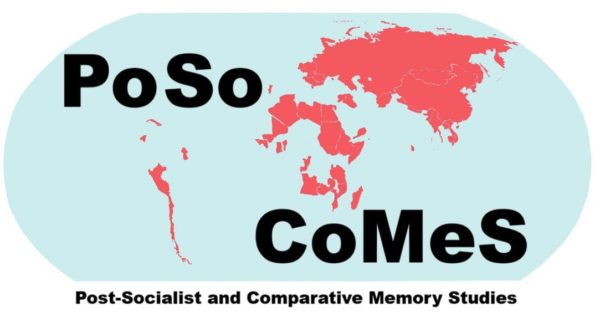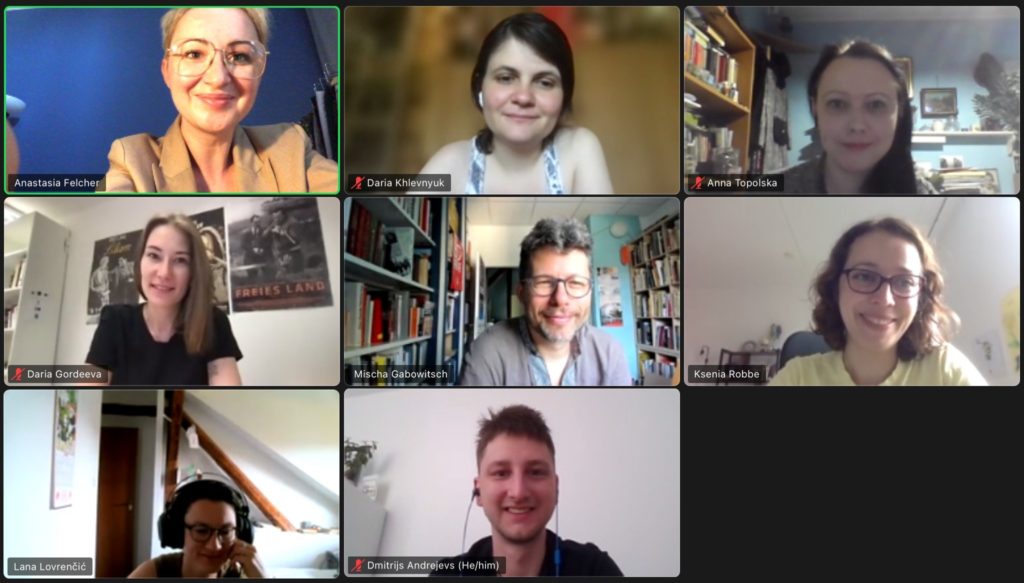WHAT IS PoSoCoMeS?
PoSoCoMeS is the working group on post-socialist and comparative memory studies within the Memory Studies Association (MSA).
is a slavic archivist at the Vera and Donald Blinken Open Society Archives (OSA) at Central European University (CEU) in Budapest. At PoSoCoMeS, Anastasia manages a website, coordinates business meetings, provides technical support to online events, and co-organizes online seminar series. Anastasia is an author of several articles and book chapters on the heritage of minorities in pluralistic societies, dilemmas of Jewish heritage in the post-Holocaust age, and literature and politics in Eastern Europe. She authored a number of media outreach materials on Cold War (counter-)archives and memory. Her current research engages with Soviet Jewish samizdat, dilemmas of memory in post-Soviet de-facto states, and with Alexander Pushkin as a public figure and political project. |
|
is a research fellow at the Department of Media and Communication at the Ludwig Maximilian University of Munich.
At PoSoCoMeS, Daria manages a website and takes part in all endeavors of the working group. Daria specializes in media discourse analysis as well as cultures of remembrance and politics of memory in international comparison with focus on Germany and Russia. Her current research engages with the “Media legacy of the GDR” as well as the construction of the GDR in Film. |
|
is a lecturer and an assistant professor at the School of Cultures, Languages and Area Studies at the University of Nottingham.
Ute is a co-founder of the PoSoCoMeS working group and is part of the editorial team for the blog. Ute specializes in GDR studies, life writing, relationship between autobiographical memory and life writing, and East German memory before and after German unification. Her current research engages with political autobiography. |
|
is a researcher at the Institute of History of the Slovak Academy of Sciences, Department of contemporary history. In 2022-2023, she carried out her research project “Iconoclasm in Czechoslovak Public Space after 1989. The Heritage of Socialism in Historical Perspective” as a post-doctoral fellow at the Institute of Contemporary History of the Czech Academy of Sciences. She is currently preparing a monograph focusing on Soviet war memorials in Czechoslovak public space after 1989. She previously completed her Ph.D. within the joint (cotutelle) Ph.D. programme of the Institute of History, Slovak Academy of Sciences (Faculty of Philosophy, Comenius University Bratislava) and INALCO Paris (University of Languages and Civilisations). She completed her master’s in museum studies at the Sorbonne University in Paris in 2012.
Email: petra.hudek25@gmail.com |
|
is a research fellow at Poletayev Institute for Theoretical and Historical Studies in the Humanities; an associate professor at the Faculty of Urban and Regional Development and Vysokovsky Graduate School of Urbanism at the Moscow campus of the National Research University Higher School of Economics (HSE).
Daria is a co-founder of the PoSoCoMeS working group, she communicates on the working group’s affairs to the MSA, and coordinates the working group’s social media and e-mail. Her current research engages with difficult pasts and contested collective memories, specifically in present-day Russia with a focus on the commemoration of Stalinist purges in Russian museums. |
|
is an art historian working at the Institute of Art History in Zagreb.
Lana is a co-founder of the PoSoCoMeS working group, she coordinates conference organization and is part of the editorial team for the blog. She has published on the memorialization of the Yugoslav people’s liberation struggle in authentic historical localities. Lana has co-curated several exhibitions, including Monuments in Transition. Destruction of People’s Liberation Struggle Monuments in Croatia (2012) and On Revolution Roads: Memorial Tourism in Yugoslavia (2015), and co-organised two international conferences, Socialist Monuments and Modernism (2015) and War, Revolution and Memory: Post-War Monuments in Post-Communist Europe(2017). |
|
is a senior fellow at the Federal Centre of Theoretical and Applied Sociology at the Sociological Institute of the Russian Academy of Sciences in Saint Petersburg.
Maria is a co-founder of the PoSoCoMeS working group; she coordinates the working group’s social media and e-mail, coordinates conference organization and co-organizes online seminar series. Her current research engages with social/historical memory in Russia and the other former Soviet states, with an emphasis on generational effects, public attitudes within the field, and the impact of memory politics on public views. |
|
is a senior lecturer in Russian and European literatures and cultures at the University of Groningen. Ksenia is a co-founder of the PoSoCoMeS working group; she communicates on the working group’s affairs to the MSA, administrates the listserv, coordinates conference organization and is part of the editorial team for the blog.
Ksenia is the author of Conversations of Motherhood: South African Women’s Writing Across Traditions (2015) and co-editor of Post-Soviet Nostalgia: Confronting the Empire’s Legacies (2019). Her current research engages with memories of the transitional periods in post-Soviet and post-apartheid literature, film, and visual art. |
|
is a cultural historian of Modern Eastern Europe, a museum specialist, and a Polish-English translator of texts in the humanities.
At PoSoCoMeS, Anna coordinates the working group’s social media and e-mail and co-organizes online seminar series. Anna specializes in visual studies, and her research interests focus on war photography, memorials & museums, trauma, and visual rhetoric. She has published on the visual dimensions of the Balkan conflict, war in Vietnam, second world war, and anti-communist uprising in Poznań in 1956. She has also written theoretical essays on the question of visual truth and ethics, and methods of visual analysis, as well as co-edited a book on methodology of history. In addition, she took part in academic and curatorial projects concerning memory of postindustrial Detroit, and memory/visuality/identity in the context of postcolonial Congo. Currently she is working on a book entitled Memory and Visuality. Representations of the Second World War in Poznań in the 20th and 21st centuries. |
|
is a research fellow at the Osteuropa-Institut and Peter Szondi-Institute for General and Comparative Literature at the Free University of Berlin. Heike coordinates the “Prisoner of War Project” at the German War Graves Commission (Volksbund Deutsche Kriegsgräberfürsorge e.V.).
At PoSoCoMeS, Heike takes part in all endeavors of the working group. Heike specializes in Russian and Soviet epistolary, autobiography research, East European youth cultures and World War II in contemporary Eastern European literatures. |
|
is a postdoctoral researcher at the Centre for Anthropological Research on Museums and Heritage (CARMAH), Humboldt-Universität zu Berlin.
At PoSoCoMeS, Andrei is part of the editorial team for the blog. Andrei’s research is situated at intersections of memory studies, public history, museum studies, and media studies. Currently he is engaged in an ethnographic study of the Humboldt Forum’s audiences, conducted as part of CARMAH’s major project titled Making Differences: Transforming Museums and Heritage in the 21st Century. Andrei is a co-editor of Politika affekta: muzey kak prostranstvo publichnoy istorii [Politics of Affect: The Museum as a Public History Space] (2019) and of Vse v proshlom: teoriya i praktika publichnoy istorii [All Things Past: Theory and Practice of Public History] (2021). His work has been published in Europe-Asia Studies, Problems of Post-Communism, Media, Culture & Society, Laboratorium, Novoe Literaturnoe Obozrenie, and other journals. |
 Historical memory is “hot” across the post-socialist world, including the former Soviet republics, East Central Europe and the Balkans, but also China, Vietnam, or Cuba, as well as among the members or heirs of international socialist movements. Accordingly, collective memory has attracted much interest among academic specialists in all of these regions.
Historical memory is “hot” across the post-socialist world, including the former Soviet republics, East Central Europe and the Balkans, but also China, Vietnam, or Cuba, as well as among the members or heirs of international socialist movements. Accordingly, collective memory has attracted much interest among academic specialists in all of these regions.